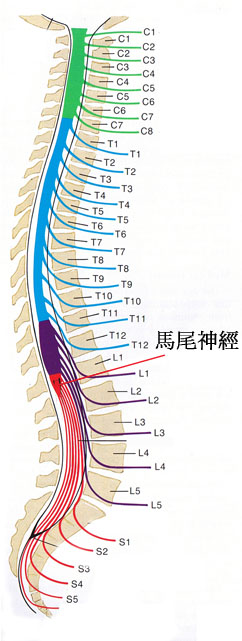
2013-11-29

圖一
What is Cauda Equina Syndrome (CES)?
The cauda equina is located at the caudal and bottom of the spinal cord, and extends from the bottom of the spine and to other organs in the body. (Picture 1) Since it looks like there’s a bunch of horsetails the name cauda equina was named.
The cauda equina mainly manages the functions of the limbs, bladder and large intestine. If the cauda equina nerve is compressed, or even permanent damage it will eventually affect the excretory function and cause the patient to suffer long-term incontinence.
Causes of Cauda Equina Syndrome
1) Severe (intervertebral disc) bulging and bone spur compressing the cauda equina nerve.
2) Spinal tumors
3) Bacterial infection
4) Spine fracture
5) Severe spinal stenosis
6) Severe injuries to the spine (such as injuries from a car accident, falling from heights or stab wounds to the low back)
7) Congenital spinal disease
Symptoms
In addition to the extreme pain in the low back, the patient will continue to find the following symptoms:
1) Obstruction of excretion function (such as obstruction or stagnation of urine, incontinence of urine and feces)
2) Loss of sensation on the legs, buttocks, inner legs, and feet.
3) Pain in one or both feet and weakened muscle strength. The patient cannot move or stand after sitting down.
4) Imbalance of sexual function or sensitivity.
Diagnose
The doctor will do a nerve reflex test, muscle strength test and nerve sensory test for the patient. MRI scans is necessary to confirm the diagnosis. From the patient’s medical record, it is necessary to know whether the patient has the following conditions:
1) Have you hurt your back recently?
2) Have you received lumbar spine surgery recently?
3) Have you ever had cancer in the past?
4) Have you ever had a serious bacterial infection?
Treatment
When cauda equina compression syndrome is diagnosed, emergency surgery is generally required immediately. If the surgery is not performed in time, the consequences will cause permanent damage to the cauda equina nerve and cause permanent incontinence.
Once the cauda equina nerve is compressed and causes permanent functional damage, it will not help even if it is operated. The patient has to learn to deal with incontinence. In severe cases, it may be necessary to rely on analgesics for a long time to relieve pain in the lower back and feet. Therefore, the symptoms of low back pain should not be ignored. People who suffer from low back pain for a long time should seek medical advice immediately to find out the root cause of the pain to avoid serious consequences.

 Book an Appointment
Book an Appointment


